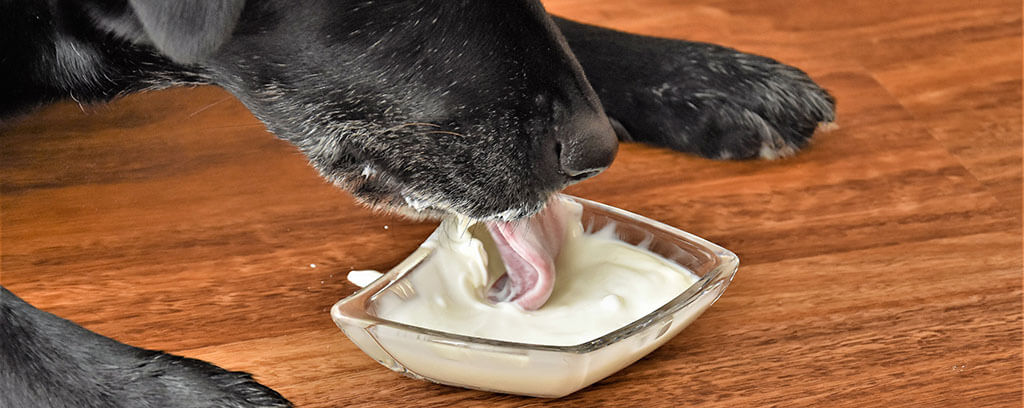Can dogs eat yogurt? Does yogurt offer any health benefits, or is it something to avoid giving to your pup? Keep reading to find out if it’s safe to give your dog yogurt…
Is Yogurt Good For Dogs?

Key facts:
- Yogurt is high in calcium and protein and contains gut-friendly live cultures, acting as a natural probiotic.
- Many dogs lose the ability to digest lactose after puppyhood, which can lead to lactose intolerance. Clinical signs include loose stools, constipation, gas, vomiting, and abdominal cramps.
- It’s recommended to give dogs plain, natural yogurt.
- Some yogurts are not advised for dogs due to added sugars, artificial sweeteners, and the potential presence of xylitol, which is toxic to dogs.
- While yogurt is a source of probiotics, specific probiotic supplements might be more suitable for dogs’ gut health.
Yogurt; it has many positive connotations! We know, for us humans, the ample health benefits it can offer us. From being a natural source of nutrients (including vitamins B, D, B12, calcium, and potassium) to supporting our digestive health, yogurt has been touted as a miracle food for many years…
But does it offer the same health benefits for our furry companions?
Well, it turns out the answer isn’t that simple. In fact, you can give your pup yogurt, but it may not offer as many positive benefits to your dog as you may think…
Can Dogs Eat Yogurt?
In short, yes, dogs can eat yogurt, but there are actually a few things we pet parents need to know before we start adding it to our pup’s daily diet…
High in calcium and protein, yogurt is also packed with gut-friendly live cultures that can help support gut health – acting as a natural probiotic. So, with these benefits in mind, you may think that yogurt only offers positives, however, there are some things to consider when adding yogurt to your dog’s meals.

What are the Dangers of Yogurt for Dogs?
Firstly, if you do decide to add yogurt to your pup’s diet, it needs to be plain, natural yogurt with lots of live cultures, free from any additives, artificial ingredients, or sweeteners – especially xylitol.
Lots of yogurts contain xylitol, which is extremely toxic to dogs. This is why it is so important to check the ingredients and only give your dog a specific type of yogurt. Xylitol has also been listed under the name of birch sugar, so be on the look out.
Now, xylitol and other artificial ingredients aren’t the only dangers yogurt can pose. Many yogurts also contain lactose – which can cause some issues for your pup’s digestion.
You see, once your dog has grown into a young adolescent and no longer feeds from their mother, they often lose the ability to digest lactose properly, unable to make enough digestive enzymes to break the lactose down – meaning many dogs actually have a lactose intolerance.
And, if your pup is lactose intolerant, yogurt can do more harm than good!
Signs of Lactose Intolerance & Dairy Allergy
The signs of canine lactose intolerance are actually very similar to what we humans experience, too – commonly causing some digestive issues, including:
- Loose stools
- Constipation
- Gas
- Vomiting
- Abdominal cramps
If you notice any of the above signs after your dog has consumed yogurt, stop feeding yogurt right away and seek medical help if the signs do not resolve.
Top Tip: Always consult with your veterinarian before introducing new foods into your dog’s diet.
What Type of Yogurt can Dogs Eat?
As mentioned above, plain yogurt with lots of live cultures, free from any additives, artificial ingredients, or sweeteners like xylitol, is ideal, and, in the right quantity, can be a delicious, healthy treat for your dog.
Let’s take a look further at what yogurts are good for dogs…
Can Dogs Eat Greek Yogurt?
Greek yogurt can be a suitable treat for dogs in moderation, provided it is plain and does not contain any added sweeteners (xylitol) or artificial ingredients.
Greek yogurt is typically higher in protein and lower in lactose than regular yogurt, which can be beneficial for dogs. However, some dogs may still be lactose intolerant and could experience digestive upset.
As with any new food, it’s best to introduce Greek yogurt to your dog’s diet gradually and in small amounts, monitoring for any signs of digestive distress.

Can Dogs Eat Flavored Yogurts?
Flavored yogurt, like strawberry yogurt, is generally not recommended for dogs, primarily because it often contains added sugars and harmful artificial sweeteners. Additionally, the added flavors and preservatives in these yogurts can upset a dog’s digestive system.
Can Dogs Eat Frozen Yogurt?
Frozen yogurt is okay for dogs to eat, but once again, you need to only give it to them in moderation, and be cautious about the ingredients.
Instead of getting commercial frozen yogurts, why not make it at home? That way, you can ensure that you’re using plain yogurt with no nasty additives.
How to Give Your Dog Yogurt
Introducing yogurt into your dog’s diet can be a tasty treat for them, as well as a source of additional nutrition. However, it’s important to do so thoughtfully to avoid any digestive issues.
Here’s how you can safely give yogurt to your dog:
1. Start with small quantities
Begin with a small amount of unsweetened, plain yogurt to see if your dog enjoys it. A teaspoon is perfect for small dogs, while a tablespoon may be suitable for larger dog breeds.
2. Choose wisely
Always opt for plain, natural yogurt that is low in fat and free from any added sugars or artificial sweeteners. Read the label to ensure it does not contain xylitol.
3. Give as a treat
Give your pup yogurt sparingly as a treat, not as a meal replacement. You can place a dollop on top of their regular food, use it to hide medications, or freeze it in ice cube trays for a refreshing snack.
4. Use as an enrichment tool
Spread yogurt on a lick mat or stuff it inside a toy to provide mental stimulation and slow down the eating process, which can aid in digestion.
5. Consider probiotics
If you’re adding yogurt to your dog’s diet as a probiotic, consult with your vet for the appropriate type and amount. They may recommend a dog-specific probiotic supplement instead.
6. Homemade options
For a safer alternative, consider making homemade yogurt to ensure it’s free from harmful additives.
By following these steps, you can make yogurt a safe and enjoyable treat for your furry friend. A regular routine can help maintain gut health.
How Much Yogurt Should I Give My Dog?
When it comes to feeding your dog yogurt, size matters. The portion of yogurt your dog can safely consume depends on their weight, overall health, and individual tolerance to lactose. Here’s a simple guide to help you determine the right amount of yogurt for your dog based on size:
Small Dogs (up to 20 lbs): For small breeds, a teaspoon of natural, plain yogurt is a safe amount to start with. If they tolerate it well without any signs of digestive upset, you can offer this amount once or twice a week.
Medium Dogs (20-60 lbs): Medium-sized dogs can usually handle a bit more. Begin with a tablespoon of yogurt and observe their reaction. If all seems well, this amount can be given a few times a week as a healthy treat.
Large Dogs (60-90 lbs): Large dogs can often enjoy two tablespoons of yogurt. Start with one to ensure they digest it well, then you can offer this larger amount as part of their regular diet twice a week.
Giant Breeds (over 90 lbs): Giant breeds may be able to consume up to three to four tablespoons of yogurt, but it’s crucial to start with a smaller amount to gauge their tolerance. If there are no adverse effects, you can offer this serving size a couple of times a week.
Is Yogurt a Natural Probiotic for Dogs?
While yogurt is a good source of probiotics, it isn’t the best way to provide your dog with gut support. With the risk of causing stomach upsets, it would be ideal to add a specific probiotic supplement to your dog’s daily routine.
PetLab Co.’s Probiotic chews for dogs have been formulated to provide a unique blend of properties, antioxidants & live cultures to help balance healthy bacteria and support the digestive system.
Final Thoughts on Yogurt for Dogs
If you’re considering giving yogurt to your dog, it’s safest to stick with plain, unsweetened varieties. Even then, it should be given in moderation, especially if your dog is lactose intolerant or has a sensitive stomach. Whether you use it to help your pup gobble up a supplement, spread it over a lick mat, or freeze small amounts with other foods for your dog as a summer treat, yogurt has its positives and negatives.
Remember, always consult your veterinarian before introducing new foods into your dog’s diet, or if you’re unsure – they will help you and advise what is best for your pup.
Sources
Author Riley, Katherine “Can Dogs Eat Yogurt?” American Kennel Club, May 11. 2015 https://www.akc.org/expert-advice/nutrition/can-dogs-eat-yogurt/
Author Grewal, Gogi “Is Yogurt Good For Dogs?” Dogs Naturally Magazine, Jan 04. 2022
https://www.dogsnaturallymagazine.com/can-dogs-eat-yogurt-probiotics/
 B
B



